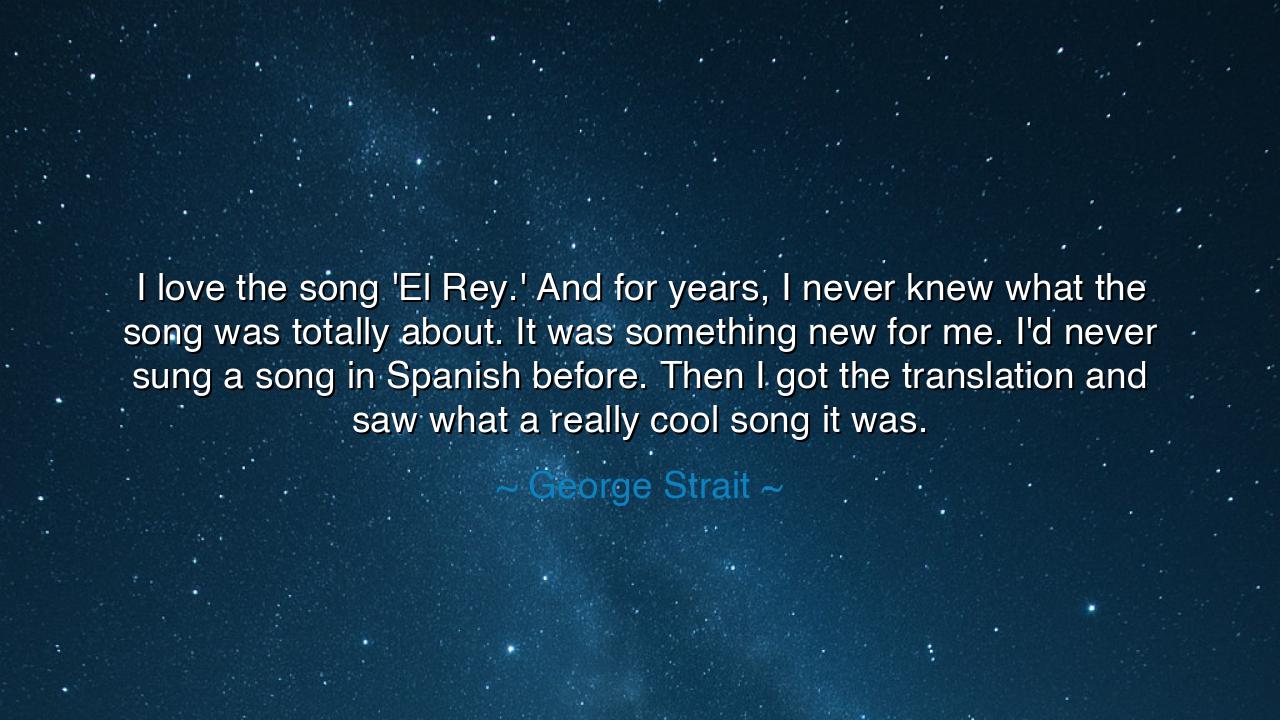
I love the song 'El Rey.' And for years, I never knew what the
I love the song 'El Rey.' And for years, I never knew what the song was totally about. It was something new for me. I'd never sung a song in Spanish before. Then I got the translation and saw what a really cool song it was.






“I love the song ‘El Rey.’ And for years, I never knew what the song was totally about. It was something new for me. I’d never sung a song in Spanish before. Then I got the translation and saw what a really cool song it was.” – George Strait
Hear these words, O traveler of sound and soul, for in them lies not just the admiration of a melody, but a revelation of understanding. When George Strait, the troubadour of the American plains, spoke of “El Rey,” he spoke as a man awakening to the power of language, culture, and the shared rhythm of humanity. At first, the song’s beauty reached him only through its sound—through the emotion carried in the singer’s tone, the cadence of the music, and the spirit behind it. Yet only when he came to understand its meaning, through translation and reflection, did the song open its deeper truth to him. Thus his words become a parable: that understanding transforms appreciation into reverence, and that what is foreign to us may, in time, become a mirror of our own heart.
The song “El Rey,” meaning “The King,” was written by the great Mexican singer and composer José Alfredo Jiménez, whose voice carried the pride, solitude, and resilience of the soul. It tells of a man stripped of wealth and power, yet still unbroken in spirit. He proclaims, “I may be without a throne, without a queen, but I am still the king.” This is not arrogance—it is defiance against despair, a declaration that dignity cannot be taken by circumstance. When Strait finally grasped the translation, he saw not merely a tune in another tongue, but a philosophy of life. For the true king is not crowned by others, but by the unyielding belief in his own worth.
In this realization, there is a profound teaching: art transcends language, but understanding deepens the soul’s encounter with it. George Strait, though long revered in the realm of country music, stood humbled before a song outside his world. It was a reminder that the boundaries of language, culture, and genre are but veils before the unity of human feeling. To sing in Spanish, for him, was not just an artistic choice—it was a crossing over, a gesture of kinship between peoples, and an acknowledgment that music is the voice of the universal heart.
Consider the story of Ludwig van Beethoven, who, when silence claimed his ears, continued to compose the symphonies that would echo for centuries. He could no longer hear the music as others did, yet he felt it, as one might feel the pulse of the earth itself. His greatest works were written in isolation, yet they spoke in a language that transcended every border. So too with George Strait’s discovery of “El Rey”—he reminds us that the truest art is that which speaks beyond words, but that to seek understanding is to open ourselves to even greater beauty.
The ancients knew that to learn the language of another people is to touch their soul. It is to walk in their stories, to taste their sorrows and joys. When Strait found meaning in the song’s translation, he bridged not only language, but spirit. He entered a tradition rich with pride and humility, a music that had long sung of life’s hardships and triumphs. In so doing, he honored not only “El Rey” itself, but the people from whom it was born. And this, too, is wisdom: to approach what is foreign with curiosity, not fear—with reverence, not presumption.
O listener, take this lesson into your heart: when something is unfamiliar, do not turn away. Whether it be a language, a culture, or a person, approach it with wonder. Listen first to its music—the tone, the rhythm, the feeling—and then seek its meaning. For beauty without understanding can touch the ear, but beauty with understanding transforms the heart. Like George Strait, you too may find that what once seemed distant or strange holds truths that belong to all humanity.
Thus, the lesson of this quote shines clear: the world becomes wider when we listen deeply, and richer when we strive to understand. Do not confine yourself to the borders of the known. Seek new songs, new stories, new ways of seeing. Learn from others, for every language holds a wisdom, every culture a reflection of your own spirit. And when at last you see beyond translation, you will know—as George Strait did—that the beauty of art lies not only in sound, but in the shared truth of the human heart.
So let it be remembered: music is the bridge, and understanding is the crown. When you open your heart to both, you, too, become El Rey—the sovereign of your own spirit, crowned not by power, but by connection, compassion, and the courage to listen.






AAdministratorAdministrator
Welcome, honored guests. Please leave a comment, we will respond soon